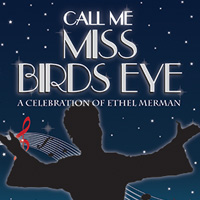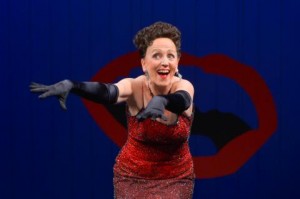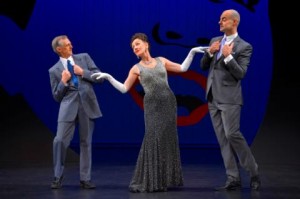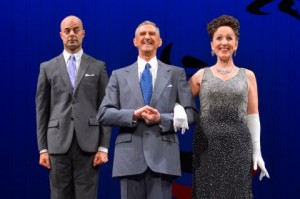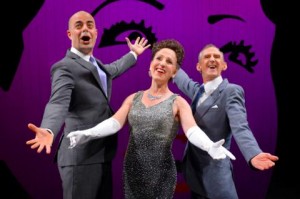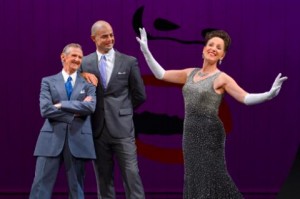MAY THIS SHOW NEVER BE FROZEN
One of the first rules of etiquette I ever learned was: if you can’t say something nice, don’t say anything at all. Were I inclined to heed that sage advice, my review of Call Me Miss Birdseye: A Celebration of Ethel Merman would end right here. However, as a journalist that’s never an option, and as a lifelong theater devotee and fan of the late, great Merman, it would be unthinkable.
Ethel Merman (nee: Ethel Agnes Zimmerman), a native of Astoria, Queens, New York, was often called “the undisputed First Lady of the musical comedy stage.” She didn’t so much perform for an audience as overwhelm it with her out-sized personality and clarion voice, which could take the chrome off a bumper at 1,000 paces. When Merman took the stage, she owned it, and woe be to anyone else onstage foolish enough to attempt to pull focus. Merman was The Star. Period. These qualities annoyed some but endeared her to many, especially Broadway songwriters, who loved the fact that every lyric could be heard in the last row of the balcony. Whatever her contemporaries thought of her, her ability to fill a theatre with her voice and incredible energy were never in dispute. None of these qualities is on display in Call Me Miss Birdseye, which opened at ACT’s Geary Theater last night.
Founded in 2012, and claiming to be “the only acoustic theater company in the world,” Australia’s Acoustic Voice prides itself on utilizing the Italian Bel Canto technique of singing, employed by some musical theater performers of yesteryear and kept alive by past and current opera singers (Joan Sutherland, Maria Callas, et al). In keeping with that tradition, Acoustic Voice presents live musical performances without electronic amplification. In theory it’s a lovely idea, especially in this day and age of ear-splitting and/or badly mixed audio, which can spoil an otherwise wonderful performance (think San Francisco’s own Orpheum Theater).
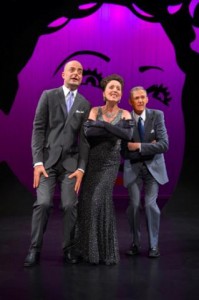 Of course, one assumes that the first thing a theater company employing this conceit would do is to engage the services of singers whose voices are up to the task at hand. One would be wrong. Sadly, Call Me Miss Birdseye does not come through, and it is frankly an insult to Merman’s hard-won legacy.
Of course, one assumes that the first thing a theater company employing this conceit would do is to engage the services of singers whose voices are up to the task at hand. One would be wrong. Sadly, Call Me Miss Birdseye does not come through, and it is frankly an insult to Merman’s hard-won legacy.
The woefully miscast Denise Wharmby has a small, attractive voice, but one that bears no resemblance whatsoever to the trumpet-like quality of Merman’s. What’s needed here is a BIG, brassy voice–a huge mezzo belt accompanied by an even bigger stage presence. Not only are there none of Merman’s “money notes” in evidence, Ms. Wharby’s almost tentative manner belies any connection with Merman’s huge stage persona. Don’t they have Youtube in Australia??? I was seated in the seventh row of the orchestra section, and Wharmby’s voice was just (and I mean just) audible. I can’t imagine what they were (not) hearing in the balcony. Wharmby also doesn’t employ even a hint of Merman’s Queen’s accent.
Wharmby is joined onstage by Music Director/Acoustic Voice’s Artistic Director, Graham Clarke, at the piano; and Narrator/Performers Don Bridges and Martin Grimwood. Neither Mr. Bridges nor Mr. Grimwood are strong singers or dancers, and both appear to have just learned the awkward, clumsy choreography. Most of their “comedy bits” fall flat; hence, they lend weak support to Wharmby. The fact that Bridges and Grimwood are onstage more than Wharmby throughout Act II is noticeable and strange. One of Merman’s signature songs, Call Me Madam’s “You’re Just in Love,” an iconic counterpoint duet–written for Merman and Russell Nype by Irving Berlin–is performed by Bridges and Grimwood, an odd choice at best.
Call Me Miss Birdseye was written by the late Jack Tinker for the show’s first, and only, production in London’s West End, in 1985, a year after Merman’s death from a brain tumor. Acoustic Voice “luckily” unearthed the only surviving copy of the libretto and are “excited to share this gem of a show with the San Francisco Bay Area.” Where are the termites when you need ’˜em? The libretto attempts to tell the story of Merman’s life in chronological order, starting with her humble beginnings in Queens, as a stenographer, and ending God-knows-when (Wharmby’s final Merman incarnation had big hair and a lot of sequins). We learn nothing new about Merman in this piece, which is dated, stodgy and slow, with numerous weak attempts at comedy. The fact that Merman’s song catalogue is presented out-of-order doesn’t help. In fact, Wharmby’s first number in the show is “Some People,” from the Jule Styne, Stephen Sondheim and Arthur Laurents musical Gypsy, which was, other than her star-turn in Hello Dolly (which she had turned-down originally), Merman’s final Broadway show.
The direction and choreography, by Rick Wallace, gives us staging that’s ungrounded, inorganic and clumsy and, in the case of the performers’ arm gestures, far too busy with way too much indicating. In this case, less would indeed be more. Director Clarke provides, at best, proficient, yet uninspired, accompaniment, with little or no dynamics on display. Damian Muller’s production design is attractive and unobtrusive.
Love her or hate her, the world will never again see another Ethel Merman. She spent 50 years at the top of her game, and deserves a far better tribute than this show provides. Acoustic Voice needs to go back to the drawing board and figure out a way to inject some life into this corpse.
photos by Kevin Berne
Call Me Miss Birds Eye: A Celebration of Ethel Merman
American Conservatory Theater
A.C.T.’s Geary Theater, 415 Geary Street
ends on July 19, 2015
for tickets, call 415.749.2228 or visit www.act’sf.org
